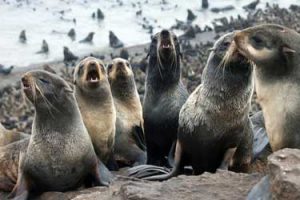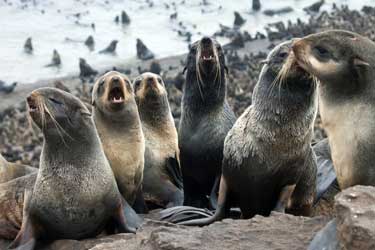
polympart: Plastic nets harm seals Discarded fishing nets contribute to the already vast and still growing amounts of plastic waste in the oceans and are a menace to fragile coral reefs. Fishing nets also pose a clear and present danger to a variety of animals from dolphins to turtles that often get entangled in them and may drown as a result.
Not even Cape fur seals are safe from fishing lines and nets, South African scientists have found.
Serious damage to nets on mammals
Hundreds of the seals, which are famed for their thick fur and live off the coasts of South Africa and Namibia, get entangled in plastic lines and nets. These lines and nets can cause serious injuries to the mammals and even lead to their deaths, say experts at Stellenbosch University in South Africa, who examined two wild colonies of Cape fur seals (Arctocephalus pusillus pusillus) in Namibia.
Seals curious and playful animals
“They are very curious and playful animals and will investigate objects in the water, but their thick, backwards-facing fur which keeps them warm at sea easily snags lines and straps and stops it falling back off,” observes Simon Elwen, co-director of the Namibian Dolphin Project.
In all, the scientists found 366 cases of entanglement among local seals by help of photographs and binoculars. Troublingly, it is mostly pups and juvenile animals that are primarily affected as they often get their their necks entangled in fishing lines.
About 8% of young animals are severely injured before help
As many as 8% of the young animals ended up suffering “very severe” injuries before they could be helped, the scientists write in a paper. On average about one in every 500 seals within the two observed colonies in Namibia got entangled in fishing lines and nets, and that ratio could get even worse.
“Once entangled, these seals face a very painful and uncertain future: finding food becomes harder and wounds can become deep and debilitating, and likely cause death in many cases,” explains Tess Gridley, co-director of the Namibia Dolphin Project who is a lecturer in the Department of Botany and Zoology at Stellenbosch University.
Luckily for many of the affected seals in the two colonies, local volunteers come to the aid of the animals and remove the troublesome nets as part of an ongoing project, launched in 2018 by university researchers and conservationists, whose aim is to understand the impacts of plastic pollution on Cape fur seals in Namibia.
This year alone several hundred seals have had to be disentangled from lines and nets by volunteers. “Since the start of 2021 we have already disentangled over 600 fur seals in only two colonies. This is the tip of the iceberg,” laments Naudé Dreyer, a member of the nonprofit Ocean Conservation Namibia.
Plastic waste, especially fishing nets and lines, is having an increasingly harmful effect on marine life, the scientists stress. Drastic reductions in plastic waste can help alleviate matters. So can initiatives aimed at recovering plastic nets dumped into seas or left behind in the water.
“Changes to policy could help, such as financial incentives to recover lines, safe disposal of nets and sustainable alternatives to plastics,” Gridley says.
source:https://www.sustainability-times.com/environmental-protection/plastic-nets-harm-seals-in-africa-but-conservationists-do-their-best-to-help/

